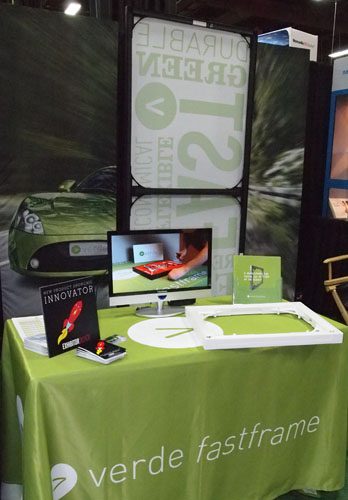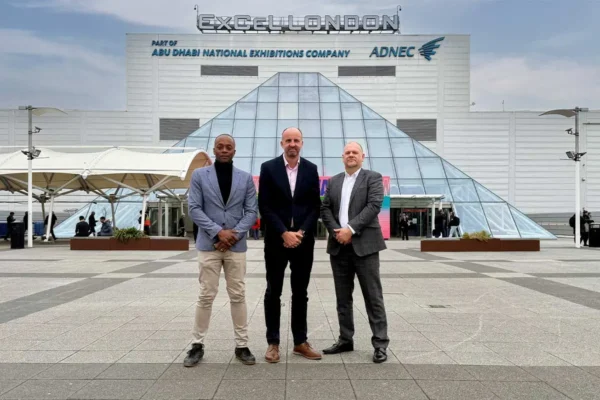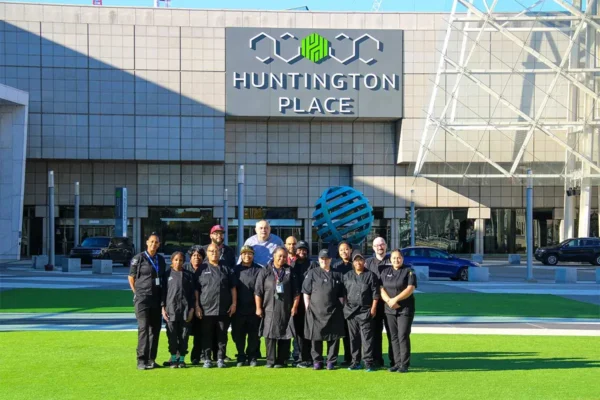Initially intended as an environmentally friendly way for retailers to display signs, banners and other displays, the Verde fastframe is gaining momentum in the tradeshow industry after a recent name change.
Originally called the Enviroframe, officials for Toronto-based Verde Fastframe Inc. nearly two years ago began marketing the display gear designed to make signs, banners and other more environmentally friendly for retailers. After initially slow sales, a change in the product’s name to “fastframe” rebranded it and repositioned it for use in the tradeshow industry where potential customers indicated far more interest.
“We see there’s definitely a need,” said Antony Rubino, president, Verde Fastframe. “There’s a diverse market. We were going more for retailers, but there is a huge potential for tradeshows and exhibitions. Everything’s been quite positive.”
Made of lightweight, 100 percent reclaimed materials, the fastframe can be put together in a couple minutes using three simple steps and no tools, which means there are no hefty union labor fees for putting up the fastframe. Every 10 feet of the polystyrene fastframe uses about 17 pounds of recycled plastic, which is equal to the amount of plastic contained within about 20 mobile phones.
A new floor stand called the V-stand enables greater use of the fastframe in tradeshows and exhibitions in addition to traditional wall mounting and hanging. And there are no limitations on size for wall-mounted and hung banners and signs. Each frame can be expanded or shortened using 4- to 12-foot extrusions pieced together with T-connectors that do not require tools. The lightweight plastic and tool-less construction make the fastframe a highly viable alternative to traditional aluminum sign frames that weigh more and usually need tools for construction.
“North America is addicted to aluminum and aluminum frames,” said Rubino. “But aluminum has its limitations. It’s time for something new.”
And the initial response from tradeshow exhibitors indicates the fastframe is one of the new products enabling exhibitors to kick their aluminum addiction while saving time, money and helping the environment. But when promoting the fastframe’s advantages over aluminum, its environmentally friendly aspect typically comes in second to cost savings.
“The sustainable aspect is not the main goal in North America like it is in Europe,” said Rubino. “People are more interested in the time and cost savings and the fact [that] there are no tools.”
With corporate responsibility and environmental sustainability playing key roles in the exhibiting plans of an increasingly large percentage of tradeshow exhibitors and organizers, the fastframe is rising in popularity, much like the use of recycled paper has in recent years.
“Twenty years ago, everyone was big on using recycled paper. Now, everyone is using it,” said Rubino. “We’re just waiting for people to come around to the fastframe. It’s time for a shift.”
Creating signs and banners for the fastframe is an easy process. Any dye-sublimated printer can do the job, and water-based printing can make it even more environmentally friendly and sustainable. And graphics must have beading to enable it to adhere to the frame and stay in place. Non-visible beading can be applied by sewing it onto the sign or by using visible, non-sewn beading to secure banners and signs to the stand. A crossbar is needed for larger signs, and there is no lighting option yet, although one is in the works. Designers are working on how to enable electrical wiring and to diffuse light properly.
Because it can be broken down into 4-foot struts, the lightweight fastframe is easy to ship through FedEx, UPS and the U.S. Postal Service, saving exhibitors time and money on transportation and storage costs. With versatility and environmental sustainability working in its favor the fastframe is proving to be a highly viable alternative to aluminum and other framing elements and saving exhibitors a great deal of cash in the process.






























